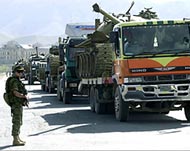Agencies welcome Afghan aid pledge
Aid agencies have cautiously welcomed pledges of at least $8 billion after international donors responded to President Hamid Karzai appeal for help with Afghanistan’s reconstruction.

But the pledges fall way short of the $27.5 billion sought by Karzai at a meeting of more than 50 donor nations in Berlin to stop his country from becoming a haven for drugs and terrorism.
Humanitarian groups on Thursday welcomed the donations but stressed the need for long term support and greater security.
“It’s extremely important that funding levels are kept up … and that funding is sustained by the international community over an extended period of time,” said Barbara Stapleton, advocacy and policy co-ordinator for the Agency Co-ordinating Body for Afghan Relief, on Thursday.
“What is really, really important is what is focused on and how the money is spent,” she told AFP.
Karzai had urged donors on Wednesday to help his country recover from the destruction of decades of war.
“What we have achieved is very promising, but let me be frank and say that the reconstruction has only begun,” he said.
Security fears
Stapleton said security should be a top priority for the international community, particularly as aid workers ran the risk of ambush, kidnap and murder.
 |
|
A Canadian soldier in Kabul. NATO |
Until now, many arrangements such as the NATO deal to expand its peacekeeping force outside of Kabul had moved very slowly on a practical level, she said.
According to Christian Aid’s Sultan Maqsud Fazl, unless security concerns are addressed, the pledged money will not have the desired impact.
“Overall it’s a good contribution if you compare it with the original pledges made in Tokyo over four or five years,” Fazl added.
But many aid agencies and thinktanks say the West’s commitment to Afghanistan has been lacklustre, and much of the aid it might have won has been diverted to post-war Iraq. It has received 10 times as much as Afghanistan – despite having roughly the same population.
US intervention
US Secretary of State Colin Powell, in his speech to the conference, expressed hope that Afghanistan would never again harbour groups such as al-Qaida.
“Never again will tyrants and terrorists rule Afghanistan and never again will Afghanistan become a seedbed of instability,” he said.
The US also announced that the first of 2000 marine reinforcements had arrived to intensify the hunt for al-Qaida fighters and boost security ahead of elections delayed partly because of security concerns. Britain is also boosting its troop presence in Afghanistan.
However, opium production – almost eradicated under the Taliban in its last year in power – has since taken off and is reckoned to be worth about half the country’s estimated gross domestic product of nearly $4 billion.
The country is believed to supply three-quarters of the world’s opium.
“Nobody wants to be called a drug dealer, especially not a whole nation,” Karzai said.